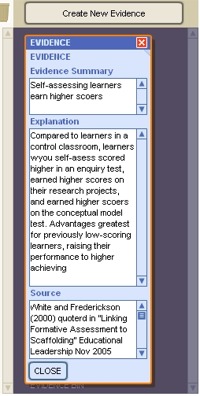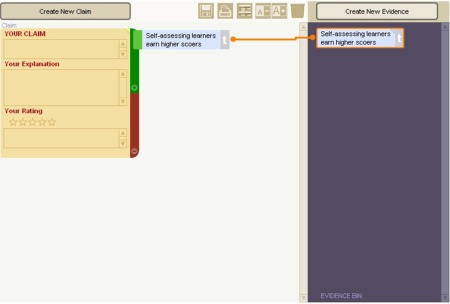Module 4 - Planning Learner-Centred Assessment
Activity 4.2
Step 1: Using the Showing Evidence Tool to Make a Case
The case that you are about to open has been pre-populated with pieces of evidence that can be used with a variety of claims. Select one or more of the assessment methods you identified in the previous activity as your claim(s) and use the evidence provided (and any additional evidence you choose to create) to support or oppose your claim. Identify concerns and questions you have about using the assessment method(s) you have chosen. Use research to help answer your concerns and questions. You can work individually or with a partner on this activity. Use the Intel® Education Help Guide if you need assistance in completing any technology skills identified below:
Go to a Showing Evidence project set up for you to explore assessment methods for your unit: www.intel.com/education/showingevidence
-
Click Enter. Then, click learner Log-In. A new window will open.
-
Log on to the Student Workspace with the same Student login that was used for the Seeing Reason “Thinking” project in Modules 1 through 3.
Add this page to your Favorites, in the Intel sites subfolder.
-
The student homepage will open. Under Project Name, click the project Assessment Methods.
Click the Create New Claim button.
- In the Your Claim area, type the claim you will try to support (from the identifying assessments worksheet). You can leave the other areas of the claim blank until after you have reviewed the evidence.
- Use the Your Explanation area to provide specific examples of the type or method of assessment or how it would specifically look in your classroom. You can also add the questions or concerns you have about using that type of assessment—questions that need to be answered by research.

Repeat directions 6 through 8 if you have more than one claim.
|
 |
| Note: A “t” on the evidence box means it is teacher-created evidence. You will not be able to edit the teacher-created evidence—only your own. |
- Review the rest of the evidence. For pieces of evidence that are applicable to your claim, rate their quality and attach them to your claim.
- If you think the evidence supports the claim, drag it to the green (upper) area.
- If you think it weakens the claim, drag it to the red (lower) area.

| Note:
Not all evidence will apply to your claim. Only use evidence that specifically
supports or weakens your claim. An easy way to review all existing evidence is to use
the Show Report feature. |
- Use the Internet and any other resources you have to add additional research-based evidence or information on best practices
| Note:
Additional resources on assessment are available at: www.intel.com/education/assessingprojects |
You may want to add comments to some of the evidence. The Comments feature can be helpful to include your thoughts as you consider how the evidence relates to your claim. You may also use the Comments feature to note any questions about the validity of the evidence, provide specific details on how you see the evidence applying to your claim, or note your questions or reactions.
![]()
Move your cursor to the upper-right corner of an evidence item and click the triangle that appears.
- Add a comment to include any questions, concerns, or thoughts about the individual pieces of evidence.
- To view all the details of your evidence in one place, use the Show Report feature.
- After reviewing all the evidence, analyze the strength of the evidence and determine whether the body of evidence supports or opposes the claim.
- Add more detail in the Your Explanation area to clarify the claim, if needed. Clarify the concerns you have about using a particular type of assessment.
- On the claim, enter a rating for how well you believe the claim is supported.

-
In the text box underneath the star rating, explain why you rated the claim the way you did.
At the bottom of the workspace, type a conclusion. Explain whether you believe the claim is supported, refuted, or undetermined—and why. The claim and evidence do not answer the question of the case by themselves; you must identify your answer and explain your reasoning in the conclusion. Include in your conclusion whether you will include the method (or methods) you identified in your claim in your Assessment Plan.

